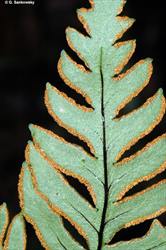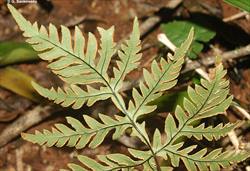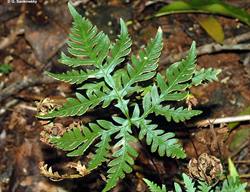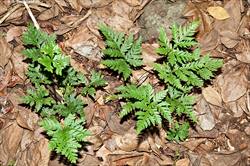Pteridaceae
Australian Tropical Ferns and Lycophytes - Online edition
Doryopteris concolor




Doryopteris concolor (Langsd. & Fisch.) Kuhn
Link to Australian Plant Name Index for publication details and synonyms: https://id.biodiversity.org.au/name/apni/177913
Resurrection Fern
Rhizome short-creeping; scales narrowly triangular, to c. 3 mm long, with a brown central stripe and pale ±entire margins, sometimes irregularly toothed towards the base; apex long-attenuate. Fronds ±monomorphic. Stipes crowded; upper part blackish brown, glossy, glabrous apart from scattered scales similar to those on rhizome, sometimes with a few short brown hairs; upper surface shallowly grooved; angles between upper surface and sides narrowly winged, becoming cylindrical towards base. Lamina tripartite, 2–3-pinnatifid, broadly triangular, often with spreading basal lobes, 3–9 cm long and wide, c. half the length of the stipe, thinly coriaceous; lamina segments lobed on both margins except for a few apical ones; basal lobes on basiscopic side of the base of lamina well-developed; upper segments decurrent on primary rachis. Rachis with scattered scales; upper surface of rachis and costae blackish brown, glossy; minor veins free, forked, not visible to the eye. Sori continuous along the margin except near lobe apices and in sinuses; indusium membranous, linear, ±continuous. Spores with smooth exospore and rugulose perispore.
Widespread in coastal
Terrestrial or lithophytic (often on but not restricted to limestone), in seasonally xeric vine forest where it is common in rocky areas in the ground layer in areas protected from fire. It grows in mesic vine forest in rocky areas where the canopy is broken and occasioanlly in rocky areas in open forest or woodland.
This fern is often called a 'resurrection fern'. In the dry season when it is desiccated the lamina rolls upwards and becomes hard and leathery and when rehydrated at the beginning of the wet season it spreads to its original shape. This species is an attractive ornamental fern.
Readily cultivated in a small pot or in the ground or on rocks in a tropical or subtropical garden or fernery.
Similar to Calciphilopteris ludens.
1a. Fronds dimorphic, veins anastomosing = Calciphilopteris ludens
2a. Fronds monomorphic, veins not anastomosing = Doryopteris concolor
Field AR, Quinn CJ, Zich FA (2022) Australian Tropical Ferns and Lycophytes. apps.lucidcentral.org/fern/text/intro/index.htm (accessed online INSERT DATE).
Field AR, Quinn CJ, Zich FA (2022) ‘Platycerium superbum’, in Australian Tropical Ferns and Lycophytes. apps.lucidcentral.org/fern/text/entities/platycerium_superbum.htm (accessed online INSERT DATE).







